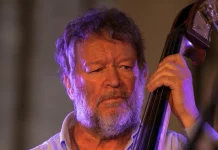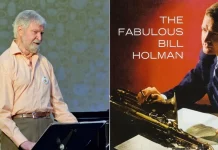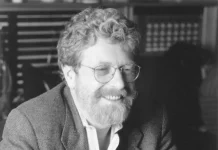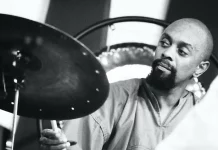The British consulate in Málaga reported this week that Bruce Crowther, who had written for Jazz Journal since the mid-70s, died in Alhaurín el Grande on 20 August 2023, aged 89. Normally a prompt respondent to emails, Bruce hadn’t replied to the usual reviewables list from the JJ office in September and after earlier reporting infirmity, back pain, a fall and increasing medical attention, he seemed to have fallen silent.
Bruce was born and raised in Hull in the north of England but moved away and early in his professional life worked in various non-musical and non-literary areas, including, according to IMDb, as an industrial designer, a manager of a manufacturing company and in financial services. In the early 70s, boredom with his working life had become intolerable. He told Jazz Journal “I cast around for an escape and decided, pretty much overnight, to try something a bit . . . well, sparkly. Showbiz maybe. That’s a laugh. Can’t dance, can’t sing. What did that leave? Writing.”
Thus he began writing crime fiction; more than half the 45 books he had published by 2019 were in that genre (most prominently under the pseudonym James Grant) and he said he enjoyed “moderate success”. One book, The Rose Medallion (1977), was serialised for BBC TV in 1981.
As a youth he hadn’t shared his elder brother’s enthusiasm for jazz but by the time he left home he had decided he liked it. His interest in the music was fuelled in part by his fascination with American popular culture. He told the University of Hull Alumni Association “I am not a musician, but the music fascinated me and I began to learn about the music’s history, rooted as it is in the history of black Americans.” As a child he had been hooked on films, especially American films and in particular film noir, and in his early teens became a voracious reader of crime fiction of the Chandler variety.
At some point in the 70s Bruce moved back to Hull, and fell in with what he called the “local jazz mafia”, which included Philip Larkin and John White, the latter then senior lecturer in the Department of American Studies at the University of Hull. Knowing of Bruce’s interest in American history and popular culture, John suggested he attend as a mature student and read for a degree in American Studies.
Bruce’s primary interests – books, films and music – became intertwined and his subject matter expanded accordingly. After his ninth crime novel, a publisher asked him if he’d like to write on film and so Hollywood Faction: Reality And Myth In The Movies was produced. Another publisher conversation led to the publication of The Jazz Singers: From Ragtime To The New Wave (1986, written with Mike Pinfold). He also wrote a biography of Gene Krupa (His Life And Times, 1987) and two more jazz books with Pinfold, The Big Band Years (1988) and Singing Jazz: The Singers And Their Styles (1997). Outside jazz, he collaborated with Pinfold on Bring Me Laughter – Four Decades of TV Comedy (1987, Columbus Books). For a number of years he had a weekly jazz show on Viking Radio. He was later also a major contributor to The Encyclopedia Of Popular Music, edited by Colin Larkin, where he wrote over 5000 biographical entries.
As a reviewer of records and books for Jazz Journal, specialising in singers, Bruce was prolific, reliable, well organised and impeccably literate, his copy needing the lightest of editing. His comments were fair, always informative and always accentuated the positive. He had broad tastes and would review almost anything but he had strong views on what jazz singing was and was not. Declining to write an obituary of Tony Bennett, he said “He clearly enjoyed singing with jazz musicians but never came close to being a jazz singer. Sinatra was a much better singer and understood why he wasn’t a jazz singer.” Bruce’s work will be missed by Jazz Journal and its readers. His writings for the JJ website since 2019 can be perused here.
Around the 1990s Bruce moved to the province of Málaga in Spain, where he lived until his death. His wife of some years died about a decade ago and he is not thought to have any surviving direct relatives, according to the consulate.
John White adds a personal note on Bruce Crowther:
I first met Bruce in the mid-70s when we were among the Founding Fathers of the Hull Jazz Record Society. Other luminaries included Michael Shera (already a regular contributor to JJ) and Mike Pinfold. At our meetings in rented rooms of various Hull hostelries, I came to learn more about Bruce and his enthusiasms and expertise. In addition to his passion for jazz, he was also heavily engaged with all forms of popular music and film, as well as starting to publish crime novels. These were usually based in north American cities, and all evinced a keen awareness of the American racial situation.
Aware of Bruce’s American sympathies, I suggested that he should enrol for an honours degree in the Department of American Studies at Hull. This he promptly did and was an outstanding student. Gradually, my colleagues and I began to realise what a remarkable and extremely mature student we had netted. Already he had a vitae which put most of ours in the shade, and was only just beginning to spread his wings.
Along with the jazz books mentioned in the obituary above, Bruce wrote Benny Goodman, a volume in the Jazz Masters Series (1988) which offered a warts and all account of the King’s achievements and his persisting significance. He also encouraged me to write Billie Holiday: Her Life & Times (1987). In later years, along with his crime novels and jazz writing he published a number of other books on the cinema, including Film Noir: Reflections In A Dark Mirror, Mitchum: The Film Career of Robert Mitchum (1991), and Michelle Pfeiffer: A Biography (1994).
After he moved to Spain in the 1990s we temporarily lost touch, but contact was thankfully re-established (by email) until his recent death. Bruce taught me much more than I taught him, and for this I will always be grateful.
Colin Larkin, editor of The Encyclopedia Of Popular Music, writes:
Deeply saddened to hear about Bruce – my last six emails were unanswered and so I feared the worse. He had been a wonderful colleague for over 30 years. His contribution to my EPM was immeasurable – he tapped into an area of jazz that was not in my reach. He would constantly take the piss (gently) about my love for Miles and Jimmy McGriff.
Of all the writers that have worked for me since 1990 he was quite simply the most professional and never missed a deadline. We also shared a serious intolerance for the misuse of the English language and a loathing of populist cliché, his favourite being “110%”. His typographical standards put me to shame. I shall remember him fondly and will never forget his humour and friendship and our shared love for hard-boiled crime fiction.
Mike Pinfold writes:
Bruce had many strings to his bow. To keep solvent he regularly worked as end-of-year auditor for a variety of companies. Whenever you went with him to a restaurant or country pub you could expect someone to come up and have a chat. When you asked who it was, it invariably turned out to be an MD or owner of some company, or group of companies, that he had audited.
He also wrote with various people such as Ed Anderson, Dave Tuck and the film director, John Dark, whom he met in Spain. He wrote a number of plays for TV, which sadly were never taken up, one with John Dark which in my opinion was very good. Together, we wrote a number of comedies which again were never taken up.
One of our ideas actually got all the way to Hollywood. It was a fictionalised version of the Cotton Club story. Just as I was picking out which yacht to purchase, Francis Ford Coppola announced he was about to start filming The Cotton Club for another studio. So I went paddling at Bridlington instead. When our script arrived back, someone in Tinsel Town had scrawled across it “too many coons”.
Peter Morfoot writes:
It was with great sadness that I learned of Bruce’s death. Like so many, I was fortunate enough to be in regular email contact with him and when the flow dried up at his end, I assumed at first that the problems he occasionally experienced with his local IT network were again at fault. But, sadly, no.
He was a superb jazz and cinema critic, obviously. And a very fine and prolific crime writer. On a personal note, I will always be grateful to him for his championing of my Captain Darac Mystery series in JJ. His positive reviews were among the first to convince me that I was on to something. There was nobody quite like him. I shall really miss our chats.
Thanks also to Bruce’s fellow jazz-inflected crime novelist Joan Merrill for contacting the British consulate and solving the mystery of Bruce’s sudden silence.
















